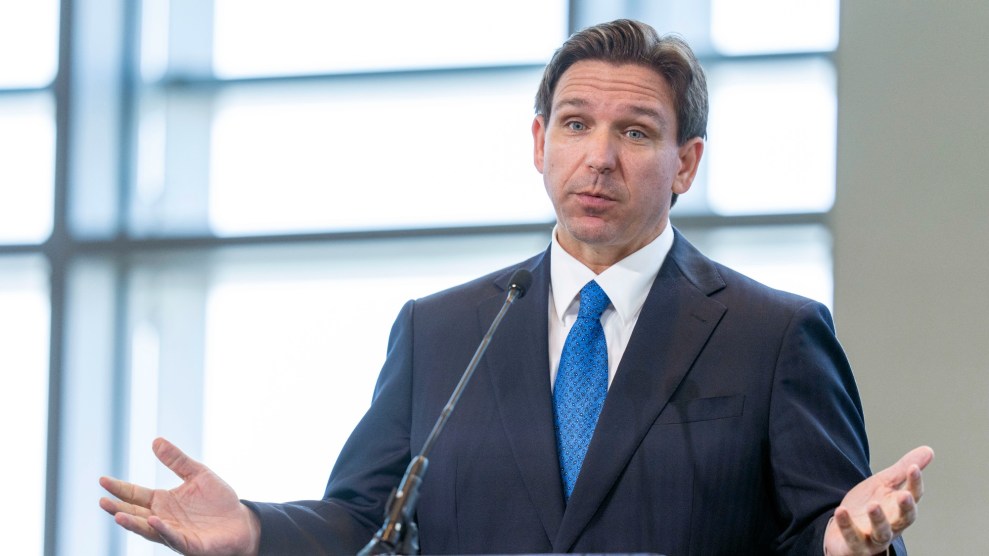
Alex Brandon/AP
Florida Gov. Ron DeSantis is gearing up for his much-anticipated presidential campaign by signing a bunch of laws targeting reproductive rights and drag shows, feuding with his wedding venue, and embarking on what people who work in campaigns—and for some reason, other people who do not—refer to as a “listening tour.”
A “listening tour” is a euphemism for a tour in which you talk a lot, mostly about yourself. The listening tour is a close relative of another kind of pre-campaign trip, which DeSantis has also recently completed, in which a would-be candidate burnishes his “foreign policy chops.” Burnishing your foreign policy chops is easy; you just have to go to a foreign country and literally do anything.
All that pre-campaign travel isn’t cheap, though. So how does DeSantis do it? On Saturday, the New York Times provided an answer: He’s flying on a lot of private jets, paid for by, well, someone:
Ahead of an expected White House bid, Mr. DeSantis has relied heavily on his rich allies to ferry him around the country to test his message and raise his profile. Many of these donors are familiar boosters from Florida, some with business interests before the state, according to a New York Times review of Mr. DeSantis’s travel. Others have been shielded from the public by a new nonprofit, The Times found, in an arrangement that drew criticism from ethics experts.
As the Times notes, it’s not unusual for candidates to take advantage of private jets. DeSantis’ top Republican opponent, Donald Trump, has his own 757. But DeSantis’ arrangement is noteworthy because of ethical loopholes he’s exploiting around disclosure. DeSantis-aligned outside groups arrange the travel and payments. And because he is merely a candidate-in-waiting rather than a declared candidate, he doesn’t really have to disclose anything else. (When actual campaigns use private jets, they do have to pay for them, which is why you end up seeing stories about how much money campaigns spend on private jets.) DeSantis recently signed a law that restricted what kinds of information Florida law enforcement can disclose about the governor’s travel.
One example dug up by the Times offered a glimpse of the obvious ethical issues this arrangement presents:
In February, Mr. DeSantis traveled to Newark on a jet owned by Jeffrey Soffer, a prominent hotel owner who, according to several lawmakers and lobbyists, has sought a change in state law that would allow him to expand gambling to his Miami Beach resort.
The February trip and others were arranged by And To The Republic, a Michigan-based nonprofit, according to Tori Sachs, its executive director. The nonprofit formed in late January as Mr. DeSantis was beginning to test the national waters and quickly became a critical part of his warm-up campaign.
This is just the way that campaign finance works now: Candidates who are obviously candidates must pretend they are not candidates, so that “social welfare organizations” that are not allowed to run campaigns can essentially run shadow campaigns for them, masked in the language of “state policy solutions” and “setting the agenda.” The loopholes just keep getting bigger and bigger. At this point, you could fly a Gulfstream through them.
















